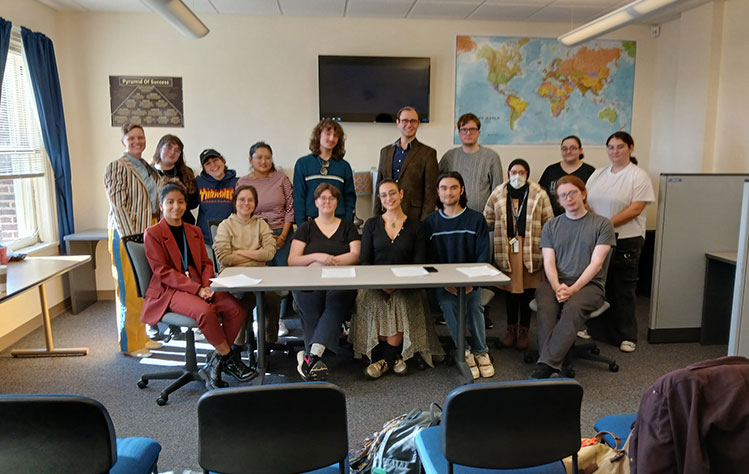Where Global Policy Meets Poetry: A Collaborative Exploration
November 19, 2024

By Dani Belo and Elizabeth Hoover
On Nov. 7, undergraduate students from Webster University gathered for a novel conference entitled Testimonies, a unique collaboration between the Global Policy Horizons Lab and the English Department’s Poetry of Witness seminar.
The event offered a platform for students to explore the power of poetry in capturing and responding to contemporary crises, featuring three thought-provoking panels: The Echoes of War, Resonances of Trauma, and The Poetics of Criminality.
Dr. Dani Belo, Assistant Professor of Security and International Relations and Director of the Global Policy Horizons Lab, emphasized the significance of bridging the analytical and the experiential in responding to global crises.
"This conference exemplifies how the humanities and social sciences can work together to deepen our understanding of conflicts and security," he said. "Policy analysis is strengthened when we remember the human stories behind statistics and strategies. Poetry, in this sense, can be a powerful tool for humanizing issues that often feel abstract."
“I designed the Poetry of Witness seminar so that the participants can make the transition from students to practitioners,” said Dr. Elizabeth Hoover, who leads the Poetry of Witness seminar. “This collaboration enabled us to do that and then some. The conference showcased the transformative power of scholarship that is not only rooted in careful research, but also driven by love and compassion.”
Moderated by Global Policy Horizons Lab researchers Maya Asadova and Devin Courville, each panel delved into the role of poetry as a witness to real-world turmoil, whether from the frontlines of war or the quieter, yet profound landscapes of trauma and criminality. Students participating in the Poetry of Witness seminar presented their editorial visions for original poetry anthologies inspired by these crises, creating a powerful bridge between poetic expression and pressing global issues.
The Echoes of War
The conference opened with The Echoes of War, a panel that centered on the theme of conflict and displacement. Students shared poems and editorials capturing the enduring scars of war on individuals and communities. These presentations sought to bring the voices of those affected by conflict into a format accessible to a broader audience, highlighting the resilience and humanity within war’s devastating context. Asadova guided the panel’s discussion, emphasizing the connection between policy analysis and personal storytelling. "This panel reinforces how essential it is to listen to those on the margins," Asadova noted. "Their stories challenge our own assumptions about security and resilience."
Resonances of Trauma
Resonances of Trauma examined the psychological aftershocks of violence and crisis, as students presented poetry that brought to life the reverberations of trauma, from individual heartbreak to collective grief. The students tackled the complexity of capturing trauma in poetry, a challenge made even more significant as their pieces often reflected urgent, real-life crises affecting communities around the world. Courville moderated the panel, facilitating a conversation on the editorial process behind anthologies on trauma.
"Through poetry, we confront suffering that defies easy categorization or solution," Courville said. "This session brought a necessary depth to how we approach trauma, both as readers and analysts."
The Poetics of Criminality
In The Poetics of Criminality, students investigated poetry’s capacity to depict societal and personal responses to crime and justice. Poems in this panel explored narratives around imprisonment, systemic injustice and the humanity of those affected by or involved in crime. As each student shared their editorial concept for an anthology that bears witness to these themes, they discussed the challenges of representing complex stories without sensationalism or simplification. The panel illuminated how poetry can expose the nuances of criminality while challenging traditional views on justice and morality.
The conference, in merging policy analysis with creative expression, fostered a collaborative environment that allowed students to engage in meaningful dialogue on how poetry can reflect, challenge and reshape our understanding of complex global issues. As they left Testimonies, participants and attendees alike carried a renewed sense of how powerful art can be in bearing witness to the crises of our times. The conference was a powerful reminder that poetry is not merely art, but testimony — urgent, resonant and transformative.
For more information about the Poetry of Witness seminar, please contact Hoover at elizabethhoover@webster.edu. To learn more about the Global Policy Horizons Research Lab, contact Belo at danibelo@webster.edu or visit the Global Policy Research Lab webpage.
